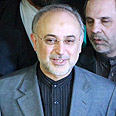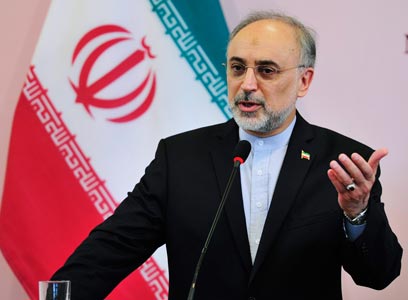
Iranian FM: We don't want nukes
Ali Akbar Salehi says Tehran has proven its opposition to WMDs on several occasions; writes in Washington Post op-ed that diplomatic solution possible through mutual respect, trust
Iran has proved that it does not seek to acquire nuclear weapons, Iranian Foreign Minister Ali Akbar Salehi said Friday in an op-ed published in the Washington Post.
"We have strongly marked our opposition to weapons of mass destruction on many occasions. Almost seven years ago, Iranian Supreme Leader Ayatollah Ali Khamenei made a binding commitment. He issued a religious edict — a fatwa — forbidding the production, stockpiling and use of nuclear weapons," he wrote.
Related stories:
- 'Iran's political rivalries cloud nuclear policy' Ahmadinejad: Iran won't surrender atomic rights US, France urge Iran to seize chance to resume talks
The article was published a day before the Islamic Republic is set to resume talks with the five permanent members of the UN Security Council and Germany over its nuclear program.
Salehi stated that Iran's opposition to WMDs has been illustrated in the past: "Our stance against weapons of mass destruction, which is far from new, has been put to the test. When Saddam Hussein attacked us with chemical arms in the 1980s, we did not retaliate with the same means. And when it comes to our nuclear energy program, the IAEA has failed to find any military dimension, despite an unprecedented number of man-hours in intrusive inspections."
According to the Iranian foreign minister, the biggest issue between Tehran and the West it the lack of trust. "All relationships — whether between parents and children, spouses or even nation-states — are based on trust. The example of the Tehran Research Reactor vividly illustrates the key issue between Iran and the United States: lack of trust."

We didn't retaliate with same means in Iraq. Selahi (Photo: Reuters)
Salehi recounted the United States' long-term involvement in setting up Iran's nuclear facilities, saying that all understandings between the Tehran and Washington "unraveled" after the Islamic Revolution in 1979.
However, even though Iran fell out of favor in the West, Selahi said it decided to pursue its civilian nuclear program. "We did what every government is obliged to do: protect and ensure the well-being of our citizens."
The Iranian foreign minister expressed hope that the two sides can rebuild trust and respect during the upcoming talks.
"Being sovereign and independent does not mean that there is no room for dialogue or diplomacy. It means that one enters any debate as an equal, based on mutual respect and justice. To reestablish trust, all sides must assume an honest approach with a view toward moving past the barriers to sincere dialogue.
"Another sign of mutual respect is a willingness and readiness to both give and take, without preconditions. This form of reciprocity is distinct from approaches that involve only taking. Most important, and this cannot be stressed enough, is that dialogue must be seen as a process rather than an event. A house can burn to the ground in minutes but takes a long time to build. Similarly, trust can easily and rapidly be broken, but it takes a long time to build," Selahi wrote.
The Iranian foreign minister concluded by saying that a diplomatic solution can only be reached through a comprehensive and respectful dialogue. "In the upcoming talks, we hope that all sides will return to the negotiating table as equals with mutual respect; that all sides will be committed to comprehensive, long-term dialogue aimed at resolving all parties’ outstanding concerns; and, most important, that all sides make genuine efforts to reestablish confidence and trust."
- Receive Ynetnews updates directly to your desktop










